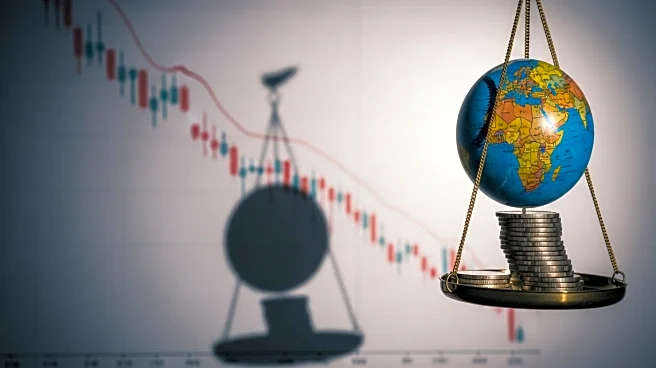What's Happening?
On October 10, 2025, U.S. stock markets experienced significant declines following President Trump's announcement of a potential 'massive increase' in tariffs on Chinese goods. The Dow Jones Industrial Average fell by 461.84 points, the S&P 500 dropped 97.67 points, and the Nasdaq Composite decreased by 466.51 points. Technology-related shares, particularly semiconductors, were among the hardest hit, with a 3.7% drop. U.S.-listed shares of Chinese firms such as Alibaba and JD.com also saw substantial declines. The announcement has raised concerns about a possible revival of the trade war between the U.S. and China, which had been paused earlier this year. Additionally, U.S. Treasury yields fell, with the 10-year yield reaching its lowest level since mid-September.
Why It's Important?
The potential increase in tariffs by President Trump could have significant implications for the U.S. economy and global trade relations. The stock market's reaction highlights investor concerns about high valuations and the potential for economic instability. A renewed trade war with China could disrupt supply chains, increase costs for businesses, and lead to higher prices for consumers. The decline in Treasury yields suggests increased uncertainty in the financial markets, which could affect borrowing costs and investment decisions. The broader impact on international markets is evident, with European shares also experiencing declines.
What's Next?
If President Trump proceeds with the tariff increase, it could lead to retaliatory measures from China, further escalating trade tensions. Businesses and investors will be closely monitoring any developments in U.S.-China relations, particularly any diplomatic efforts to resolve the situation. The U.S. government may face pressure from industry groups and lawmakers to reconsider the tariff strategy, given its potential impact on the economy. Additionally, the ongoing federal government shutdown could complicate the release of economic indicators, adding to market uncertainty.
Beyond the Headlines
The tariff threat raises questions about the long-term strategy of U.S. trade policy and its alignment with broader economic goals. The potential for increased tariffs could influence corporate decision-making, particularly in sectors heavily reliant on Chinese imports. There may be ethical considerations regarding the impact on consumers and businesses, as well as the geopolitical implications of strained U.S.-China relations. The situation underscores the complexity of balancing domestic economic interests with international diplomacy.











